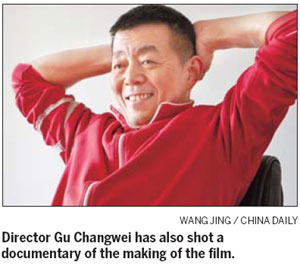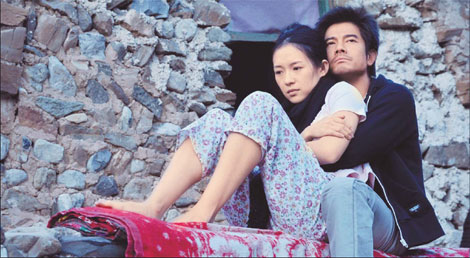Movie
Into the light
Updated: 2011-05-06 07:50
By Liu Wei (China Daily)
|
Zhang Ziyi and Hong Kong star Aaron Kwok play a couple of AIDS patients in Love for Life. Provided to China Daily |
Gu Changwei is one of the country's first directors to tackle HIV/AIDS. Liu Wei reports.
Director Gu Changwei describes himself as "a blunt man without big ambitions".
He acts the part when he speaks, flashing sincere yet shy eyes and pausing before every sentence.
"If I made a cameo in another director's film, the best role for me might be that of a silent shoemaker or carpenter," he says.
But the director has proven paradoxically bashful and brave. He has recently completed a feature film about HIV/AIDS, a topic scarcely tackled by local cinema.
Set in a village haunted by the disease in the 1990s, Love for Life tells the story of two young patients' struggle for love and dignity.
The film's opening scene sets the tone: A father beats his son in front of the entire village and forces him to apologize for initiating the illegal blood sales that caused the HIV/AIDS breakout. The son fights back and escapes the thrashing, leaving the old man kneeling before the villagers and bashing his head on the ground.
What makes the film important is that it's not only groundbreaking in tackling HIV/AIDS as its theme but also relevant in doing so now. An estimated 740,000 people in the country were living with HIV/AIDS by the end of 2009, Ministry of Health figures show. "It is a tough topic," Gu tells China Daily. "But that doesn't mean we shouldn't talk about it."
In 2008, the 54-year-old made a short film for the International Labor Organization intended to reduce the stigma surrounding the disease and to promote condom use among the country's 200 million migrant workers. His wife, actress Jiang Wenli, has worked for eight years as an ambassador of the Chinese Association of STD and AIDS Prevention and Control.
Half of China's HIV positive people remain anonymous, Gu learned from Ministry of Health experts, who provided consultations when he was shooting Love.
"Discrimination is serious. Some patients won't reveal their names because they think people will treat them differently," he says.
"If the film is meaningful in any way, it's because we bring the issue into the light."
The film's original title was An Era of Magic (the literal translation from Chinese).
"The film would be different with An Era of Magic as the title," he says.
 |
"It would be more absurd and uncanny. Magic is something you think won't happen, something that surprises you. (The new title) instead focuses on a touching love story."
Gu's original cut was longer than two hours, but the version that will hit theaters on May 10 is 104 minutes.
"I just cut some bloody and nude scenes," he says, when asked if authorities required him to edit out any content.
He emphasizes that time is the main reason the film was trimmed.
"Theater managers don't like a two-and-a-half-hour film, because such a long movie can be screened fewer times a day," he says.
But he plans to release a director's cut DVD version, which he considers to be a "panorama" of the issue.
The theater version is propelled by the love plot, which he considers reflects the brightness of an otherwise gloomy picture.
Zhang Ziyi and Hong Kong star Aaron Kwok play a couple deserted by their spouses after they contract the disease. Shunned by others, they fall in love and struggle to wed.
"When time is ticking during the countdown to death - not necessarily because of AIDS but perhaps because of a plague, an earthquake or any disaster - what attitude might we take?" Gu says.
"The most beautiful way I can imagine is to face it hand in hand, as the couple does."
Gu also uses the film to address humanity's evil undercurrents - what he calls "the other side of the moon".
Many of the characters are more disturbing than touching, as their psyches become twisted in death's shadow.
Gu says he didn't set out to create a dreary tearjerker, but also didn't intend to portray a trivial melodrama.
He was the cinematographer of Red Sorghum and Farewell My Concubine. Gu also directed Peacock and And the Spring Comes - two solemn films about ordinary people's hardships and dreams in a rapidly transforming society.
"When you see the moon, you believe it's so pure and beautiful but that's only one side of it. There's a dark side behind what you see. A real artistic work has both sides," he says.
He wants to illustrate the AIDS patients as real people, without glorifying or humbling them.
"Some lose their souls in desperation, but others' souls shine brighter in their final days," he says.
"They have both merits and shortcomings, so audiences can relate to them and develop a bond with them. That's my method for dispelling discrimination."
Three HIV positive people joined the shooting - a 13-year-old boy who appears as a supporting actor and two middle-aged crewmembers. They worked and lived with the rest of the cast and crew on location in suburban Beijing.
"If you don't initiate a handshake, they won't either," Gu says of the three. "They are sensitive but have self-esteem."
Several crewmembers were afraid of their presence and left, but most stayed. Gu brought his own child to play with the boy and encouraged his crew to befriend the patients. He even made a documentary about them, entitled Together.
"They are not guilty of wrongdoing, they are just patients," Gu says. "And I am not brave, they are."
Specials

Sino-US Dialogue
China and the US hold the third round of the Strategic and Economic Dialogue from May 9-10 in Washington.

V-Day parade
A military parade marking the 66th anniversary of the Soviet victory over Nazi.

Revolutionary marriage
A newlywed couple sings revolutionary songs during their marriage.
